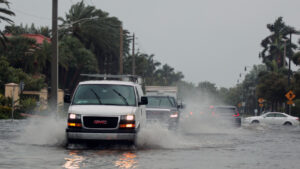This story was originally published by Grist. You can subscribe to its weekly newsletter here.
By Zoya Teirstein, Grist
Climate change is generating major economic problems in the United States, the Biden administration said in an annual report published this week. The assumptions that higher-income countries like the U.S. would safely weather the risks associated with global warming, and that those risks would be clear cut, have proven to be false, administration economists wrote. A “wide array of risks” are currently impacting the “well-being of American communities,” the White House Council of Economic Advisers wrote in its report, particularly low-income and minority neighborhoods.
Heat, flooding, wildfires, and diseases that spread from animals to humans threaten public health and health care systems, the report warns. Trillions of dollars’ worth of infrastructure like bridges, roads, and, crucially, homes, are susceptible to flooding, posing massive problems for America’s insurance industry and federal mortgage lenders. And the cost of responding to disasters such as hurricanes and drought, which have totaled hundreds of billions of dollars in some recent years, are putting a strain on local and state governments, as well as the federal government.
Those economic risks, and their unequal toll, require the government to reassess how it spends public money, from the federal to the local level.
The Economic Report of the President isn’t a binding plan, nor does it contain concrete policy proposals. Rather, it points at how the president and his cadre of economists are thinking about the biggest issues of the day. But the report is a significant document nonetheless — it offers clues about the flavor of legislation President Joe Biden is likely to try to push his party toward writing and passing over the course of 2023 and the executive actions the president may take. And it offers yet another stark warning about the dangerous direction in which climate change is taking the nation. The economic report was published on the same day as a major United Nations report that said the world is at risk of seriously overshooting its climate targets and condemning future generations to irreparable harm.
The report “paints a clear-eyed picture of the challenges we face and the actions that the federal government can take if we are to grapple with the impacts of climate change that are already unavoidable,” Rob Moore, a senior policy analyst at the Natural Resources Defense Council, told Grist.

Without intervention, some of the programs that make America’s economy tick run the risk of going bankrupt. For example, the report recommends that the government continue to reform the National Flood Insurance Program, the flood insurance system administered by the Federal Emergency Management Agency that for far too long subsidized new development in flood zones and obscured the full risks to homeowners who chose to live in those areas. The program, the report said, is “at risk of financial insolvency.” Better flood disclosure laws would help discourage these risky investments, but many states allow sellers to keep buyers in the dark. The report recommends that the federal government push states to increase transparency and climate resilience more generally, particularly as it relates to flooding. Hundreds of billions of dollars have begun flowing to states via the Bipartisan Infrastructure Law that Congress passed in 2021. The report suggests making some of that funding, and future federal funds, contingent on states adopting climate resiliency measures and passing flood risk disclosure laws.
Moore, from NRDC, heralded this recommendation as a necessary step in adapting the nation to the worsening effects of climate change, but noted that actually setting the report’s suggestions in motion would require the government to work with a greater sense of urgency. “Now the problem is getting the Federal Emergency Management Administration — and the administration — to fast-track these changes,” he said.
The report also takes aim at rampant inequity in the U.S., illuminated and exacerbated by climate change. Low-income, minority, and tribal populations live on some of the most vulnerable real estate in the country due to racism, redlining, and the forced migration of Native Americans. Changing state and federal laws to account for climate risks and the impacts of climate change on real estate, agriculture, and other sectors will necessarily lead to price hikes across the economy. “This could present challenges for low-income communities, for whom higher prices are particularly burdensome,” the authors write. The report suggests alleviating that burden by creating policies that boost income growth and “increase access to wealth-building opportunities” for those communities, and by sending America’s most vulnerable “lump sum transfers” — cash.
Moore said the window of opportunity for Biden to make these changes is coming to a close. “We’re just past the halfway point of the President’s first term and there’s a real risk of the administration running out of time to complete the changes that everyone knows are needed,” he said.
Editor’s note: Natural Resources Defense Council is an advertiser with Grist. Advertisers have no role in Grist’s editorial decisions.
This article originally appeared in Grist at https://grist.org/economics/climate-change-could-spur-severe-economic-losses-biden-administration-says/.
Grist is a nonprofit, independent media organization dedicated to telling stories of climate solutions and a just future. Learn more at Grist.org



